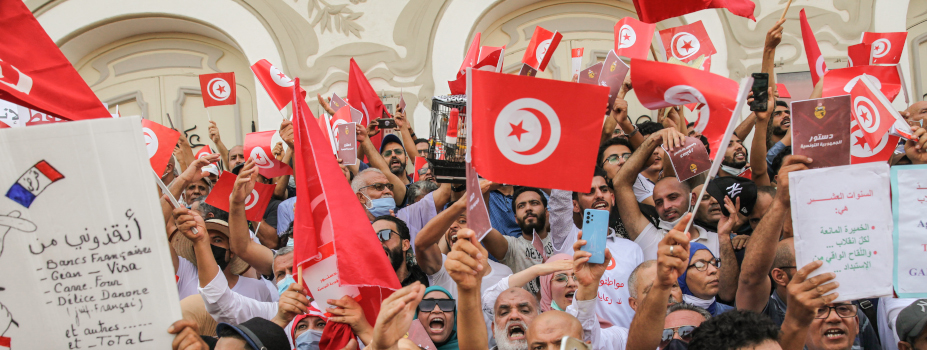In the months since Tunisian President Kais Saied’s July 25 consolidation of executive power, the atmosphere in Tunisia has been one of uncertainty and rising tension. While some Tunisians support Saied’s actions as a proportional response to the sheer scale of corruption, political stagnation, and deteriorating economic conditions in Tunisia, others see a man eliminating checks on his own power and steering Tunisia back towards the autocracy from which it has spent the last decade emerging. Saied’s recent moves are alarming to donor countries and institutions negotiating a rescue plan for the struggling Tunisian economy. Though new prime minister Najla Bouden Ramadhane has successfully formed a new cabinet, its priorities and the extent of its powers remain to be seen.
On Tuesday, November 16, 2021, the Tahrir Institute for Middle East Policy (TIMEP) hosted a virtual conversation with Chaima Bouhlel (TIMEP), Khansa Ben Tarjem (University of Lausanne), and Samah Krichah (Kvinna Till Kvinna Foundation), and moderated by Tunis-based freelance journalist Elizia Volkmann.
With all eyes on the newly formed government, our panelists considered: how can international policymakers engage with Tunisia’s new political order while centering the priorities and needs of the Tunisian people? What steps should Tunisian authorities be taking to bring the country’s transition back on track? And what role can and should civil society, the media, and everyday citizens play in ensuring that the government remains accountable to these promises?
Chaima Bouhlel is a Nonresident Fellow at TIMEP focusing on decentralization in North Africa. She is an independent consultant based in Tunisia. Over the past few years, her work has focused on the decentralization reforms taking place since the adoption of the Tunisian constitution in 2014, as well as issues of citizen participation, transparency, and good governance. She is also involved in the media scene in Tunisia, where she contributed to two different radio shows, and is currently a collaborator on a biweekly TV show, all related to current affairs, politics and public policy in Tunisia. Chaima holds a B.A. in Molecular and Cellular Biology and a secondary in Government from Harvard University. You can follow her on Twitter at @ChaimaB.
Khansa Ben Tarjem is a doctoral student in political science at the University of Lausanne and a visiting fellow at the Center for Middle Eastern Studies (Harvard University). Her thesis project concerns the “ Security services formation in post-colonial Tunisia (1954 – 1963) ”. In December 2015, she co-founded a Tunisian media and think-tank called Barr al Aman for research and media, where she is now its incumbent president. She has also worked as a freelance journalist for Le Monde and Reuters TV.
Samah Krichah is a Programme Officer with the Kvinna Till Kvinna Foundation in Tunisia focusing on feminist economic advocacy. She has over seven years experience working in civil society, international organizations, and the private sector, as well as specialized knowledge in security sector reform, transitional justice, social cohesion, gender equality, and peace and security, with a focus on Tunisia, Libya, Egypt, and Yemen. Samah holds an MSc in Women, Peace and Security from the London School of Economics and Political Science.
Elizia Volkmann (moderator) is a British freelance journalist based in Tunis for the past five years covering Tunisian politics, social and economic issues as well as the wider Maghreb and Euro-med region. She has covered Tunisian politics extensively reporting on the 2019 elections and analyzing online influence and disinformation around the political campaigns and news within the region. Her articles have appeared in The Times, The BBC, Al Jazeera English, and Al Monitor. She has made several appearances on air on TV for Al Jazeera, DW, and Euronews as well as radio for Monocle. She is also an active advocate for press freedom and the right to free speech and human rights. She has presented at conferences such as Rightscon, the annual conference on digital human rights. She is also involved in animal rescue and animal charities.
